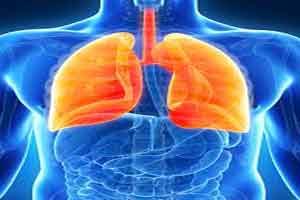- Home
- Editorial
- News
- Practice Guidelines
- Anesthesiology Guidelines
- Cancer Guidelines
- Cardiac Sciences Guidelines
- Critical Care Guidelines
- Dentistry Guidelines
- Dermatology Guidelines
- Diabetes and Endo Guidelines
- Diagnostics Guidelines
- ENT Guidelines
- Featured Practice Guidelines
- Gastroenterology Guidelines
- Geriatrics Guidelines
- Medicine Guidelines
- Nephrology Guidelines
- Neurosciences Guidelines
- Obs and Gynae Guidelines
- Ophthalmology Guidelines
- Orthopaedics Guidelines
- Paediatrics Guidelines
- Psychiatry Guidelines
- Pulmonology Guidelines
- Radiology Guidelines
- Surgery Guidelines
- Urology Guidelines
Ceftazidime and Avibactam Combo is new treatment for nosocomial Pneumonias

On the basis of positive results from a pivotal Phase 3 study,U.S. Food and Drug Administration (FDA) has approved expanded use of AVYCAZ (ceftazidime and avibactam) to include the treatment of nosocomial Pneumonias i.e hospital-acquired bacterial pneumonia and ventilator-associated bacterial pneumonia (HABP/VABP).The infections in question are caused in patients 18 years of age or older by Gram-negative microorganisms like Klebsiella pneumonia, Enterobacter cloacae, Escherichia coli, Serratia marcescens, Proteus mirabilis, Pseudomonas aeruginosa, and Haemophilus influenza. This is part of new strategies to fight these challenging infections and which were long-awaited by the medical community.
"Healthcare providers in the U.S. have not had access to a new treatment option for patients with HABP/VABP due to Gram-negative bacteria in over 15 years," said David Nicholson, Ph.D., Chief Research and Development Officer, Allergan. "Gram-negative pathogens are some of the most pressing antibiotic resistance threats and cause more than 40,000 resistant infections in the U.S. annually. Today's action by the FDA is further evidence of Allergan's commitment to improving outcomes and meeting critical needs in patients with life-threatening infectious diseases."
This is the third therapeutic indication for AVYCAZ. AVYCAZ was first approved in February 2015 in the U.S. for the treatment of adult patients with complicated intra-abdominal infections (cIAI), in combination with metronidazole, and in 2017 for complicated urinary tract infections (UTI), including pyelonephritis, caused by designated susceptible Gram-negative bacteria, including certain Enterobacteriaceae and Pseudomonas aeruginosa.
"Clinical efficacy along with patient safety are critical priorities to clinicians managing serious Gram-negative bacterial infections. We are thrilled to have a new option available to treat HABP/VABP, some of the most challenging Gram-negative infections in the hospital setting," said Jose Vazquez, M.D., FIDSA, Division Chief and Professor of Medicine Infectious Diseases, Medical College of Georgia/Augusta University, Augusta, GA.
INDICATIONS AND USAGE
Hospital-acquired Bacterial Pneumonia and Ventilator-associated Bacterial Pneumonia (HABP/VABP)
AVYCAZ (ceftazidime and avibactam) is indicated for the treatment of hospital-acquired bacterial pneumonia and ventilator-associated bacterial pneumonia (HABP/VABP) caused by the following susceptible Gram-negative microorganisms: Klebsiella pneumonia, Enterobacter cloacae, Escherichia coli, Serratia marcescens, Proteus mirabilis, Pseudomonas aeruginosa, and Haemophilus influenza in patients 18 years or older.
Complicated Intra-Abdominal Infections (cIAI)
AVYCAZ, in combination with metronidazole, is indicated for the treatment of complicated intra-abdominal infections (cIAI) caused by the following susceptible Gram-negative microorganisms: Escherichia coli, Klebsiella pneumonia, Proteus mirabilis, Enterobacter cloacae, Klebsiella oxytoca, Citrobacter freundii complex, and Pseudomonas aeruginosa in patients 18 years or older.
Complicated Urinary Tract Infections (UTI), including Pyelonephritis
AVYCAZ is indicated for the treatment of complicated urinary tract infections (UTI) including pyelonephritis caused by the following susceptible Gram-negative microorganisms: Escherichia coli, Klebsiella pneumonia, Enterobacter cloacae, Citrobacter freundii complex, Proteus mirabilis, and Pseudomonas aeruginosa in patients 18 years or older.
Usage
To reduce the development of drug-resistant bacteria and maintain the effectiveness of AVYCAZ and other antibacterial drugs, AVYCAZ should be used to treat only indicated infections that are proven or strongly suspected to be caused by susceptible bacteria.
CONTRAINDICATIONS
AVYCAZ is contraindicated in patients with known serious hypersensitivity to the components of AVYCAZ (ceftazidime and avibactam), avibactam‑containing products, or other members of the cephalosporin class.

Disclaimer: This site is primarily intended for healthcare professionals. Any content/information on this website does not replace the advice of medical and/or health professionals and should not be construed as medical/diagnostic advice/endorsement or prescription. Use of this site is subject to our terms of use, privacy policy, advertisement policy. © 2020 Minerva Medical Treatment Pvt Ltd